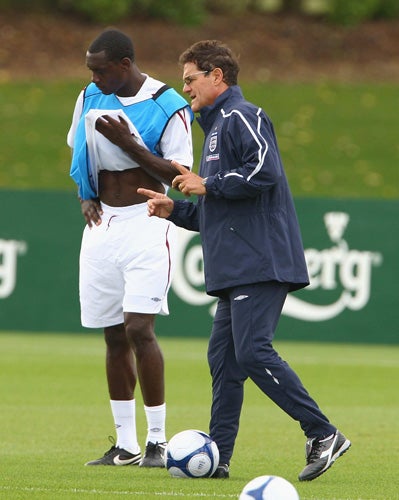Goalscoring the problem for England strike force

Michael Owen scores a goal for England every 155 minutes he spends on the pitch. Peter Crouch's record is even better, he scores one every 116 minutes he spends on the pitch for England. Fabio Capello does not believe that Owen is fit enough to play for England in the forthcoming 2010 World Cup qualifiers but without both these players, whom does he expect to score his goals?
Against Croatia on 10 September and Andorra four days earlier, Capello will pick from a pool of three strikers whose goalscoring record for England is abject. Wayne Rooney and Jermain Defoe average a goal for England every 222 minutes they spend on the pitch, which is one every two-and-a-half full games. Emile Heskey's ratio is a whopping one goal every 512 minutes on the pitch, or one every five-and-a-half games. Given that England have a habit of failing at the quarter-finals, or fifth game, of World Cup finals, the formbook says that even if you kept Heskey on the pitch for every single minute of a tournament he would not score.
Those are the reasons to fear the trip to Zagreb although the reaction to dropping Owen has tended to be more emotional, which is to be expected from a nation that has trouble letting go of the familiar old things we assume have intrinsic value: like corned beef or the Royal family. Capello has not yet written off Owen but he has disrupted a comfortable sense of destiny that Owen, on 40 goals for England, would one day surpass Sir Bobby Charlton's record of 49. Like David Beckham's 100th cap, it was the one meagre English achievement that no other country could spoil.
For his part, Capello does at least have some perspective: "I know if we win you are the best and if you lose you are the stupid man," he said yesterday. "I know this is the situation and it is my job. If you can't take the pressure you can't be in this job. For me the pressure is normal and this is my job." No-one doubts he has the courage to make those decisions, the real question, however, is whether the alternative will work.
Theo Walcott is the fourth striker in the squad although nobody apart from Capello himself actually believes the 19-year-old is currently playing for Arsenal as a striker. Everyone else sees Walcott deployed as a right-winger, Capello shakes his head and tells us he is actually playing as a striker. The poor kid must have thought that he would never encounter the same hype and subsequent backlash as when Sven Goran Eriksson picked him for the 2006 World Cup squad. Now he finds himself selected ahead of a 40-goal national institution.
One goal against Steve McClaren's FC Twente cannot hide the fact that Walcott has made painfully slow progress at Arsenal, relative to the towering standards expected of teenage players at that club. He has played 46 minutes in total for England and never scored for his country. In selecting this quartet of strikers, Capello has not even bothered to hedge his bets, he has dogmatically pursued a policy surely angled towards his 4-3-2-1 system that supports Rooney. The trouble is that if Rooney does not deliver – and he often does not – then there is no alternative.
This time there is no Steven Gerrard in the squad to get England out of trouble if Rooney fails. Over the last four years, Rooney has not responded to any of the new formations or accommodating adaptations intended to coax the best from a player who has not lived up to his billing for England since Euro 2004. Owen and Crouch offered reliable alternatives to a striker who has no track-record of scoring goals and Capello has chosen to ignore that safety net.
Then there is the inclusion of Jimmy Bullard. Coming from outside English football, Capello is allowed one of these decisions. But only one. We will call it his Chris Powell-selection, in honour of Eriksson's equally nonsensical choice to bring in the then Charlton full-back for five caps at the start of his time as England manager. Bullard is the willing, headless-chicken-type of midfielder and not an England international. Michael Johnson at Manchester City is a better player but carrying an injury. So too is Nigel Reo-Coker of West Ham and Tottenham's Tom Huddlestone who has been gifted to the under-21s instead.
The Bullard decision epitomises the most worrying aspect of Capello's selection process. He has taken a snapshot of English football since taking the job in January. He has seen a lot of games over a short period and made his judgements accordingly. He has chosen to ignore the past, which many asked him to do. But if he had allowed himself just one glance at the statistics he would have known that he has picked four strikers who do not have a reputation for international goalscoring.
Join our commenting forum
Join thought-provoking conversations, follow other Independent readers and see their replies
Comments
Bookmark popover
Removed from bookmarks